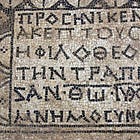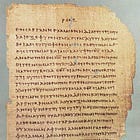Divine Disciples? 1-Minute Case Debunking Alex O’Connor: The Disciples Didn’t Forgive Sins, Judge Israel, Walk on Water or Unite with God the Way Jesus Did
John 20 and Mark 2 are dangerous places to go to try denying Christ's divinity. Only God separates sheep from goats as Judge in the Bible.

In his debate with David Wood, Alex O’Connor claimed traits used to defend Jesus’ divinity aren’t unique—since the disciples did the same. Here’s why that collapses:
Forgiving Sins
Mark 2 is a bold place to go when denying Jesus’ divinity. Jesus has authority to forgive sins on earth (v.10)—yet only God can do that (v.7).
He refers to Himself as the bridegroom of His disciples (v.19–20), a title used for YHWH (Isa. 54:5); as Lord of the Sabbath (v.28), meaning He defines its boundaries (we refute Alex on this point in Mega Debate Review); and as Son of Man (v.10, 28), the divine figure in Daniel 7 who rides on clouds like YHWH (Isa. 19:1).
Jesus also reads hearts (v.8), something YHWH alone does (1 Kings 8:39; Acts 1:24). Ehrman’s claim that this is priestly forgiveness collapses.
Jesus was not descended from Aaron, which was a requirement for priests (Num. 3:5–10), but from Judah, regarding which Moses said nothing about priests (Heb. 7:14).
When the non-Levite King Uzziah tried to perform priestly duties (2 Chron. 26:16–21), God struck him with leprosy as Uzziah was not descended from Aaron.
Moreover, no priest claimed personal authority to forgive sins.
In John 20, where the disciples are told they can forgive sins by virtue of being sent by Jesus (v.21–23), Jesus is called “my Lord and my God” (v.28) and breathes the Holy Spirit onto His disciples (v.22)—a divine act attributed to YHWH alone (Joel 2:28).
The apostles proclaim forgiveness in Jesus’ name, never their own, in fulfilment of their mission to preach the Gospel (Luke 24:47). Forgiveness is never claimed in any name but God the Saviour’s in Scripture (eg. Joel 2:32; Is. 43:11).
Judging the World
The disciples are told they will judge the twelve tribes of Israel (Luke 22:28–30)—but only under Christ’s authority, at His table and in His kingdom (v.29).
That makes Jesus the God of Israel, to whom the tribal rulers and kings submit. Jesus separates the sheep from the goats (Matt. 25:31–46), like YHWH does in Ezek. 34:17–21. Like YHWH, He judges with unquenchable fire (Matt. 3:12; Mal. 4:1), sends out His angels (Matt. 13:41; Zech. 14:5), and wields the winnowing fork to clear His threshing floor (Matt. 3:12; Jer. 15:7).
He refers to Himself as “Lord, Lord” in final judgement (Matt. 7:21; Luke 6:46), echoing the divine title for YHWH in the Septuagint. All must face His Judgement Seat (2 Cor. 5:10) and your eternal destiny depends on how you respond to Him (Luke 9:26).
Walking on Water
Peter walked only at Christ’s command—dependent on Christ’s will (Matt. 14:28–31). Jesus passed by them on water (Mark 6:48), just as YHWH passed by Moses, Elijah, and Job in divine self-revelation (Ex. 33:19–22; 1 Kings 19:11; Job 9:11), and YHWH walked on water (Job 9:8; Ps. 77:19; Isa. 43:16). He said, “I am (ego eimi). Do not be afraid” (Mark 6:50), echoing “Do not fear, I am YHWH” (Isa. 41:10–13; Josh. 1:9).
One with God
The disciples are “one” with God missionally (John 17:21), not ontologically in the same way as Christ.
Jesus, unlike His followers, shared glory with the Father before the world began (John 17:5), and believers partake in the divine nature only through Him (2 Pet. 1:3)—the One who rescues them from the pit as only YHWH does (Ps. 103:4; Mark 10:45).












